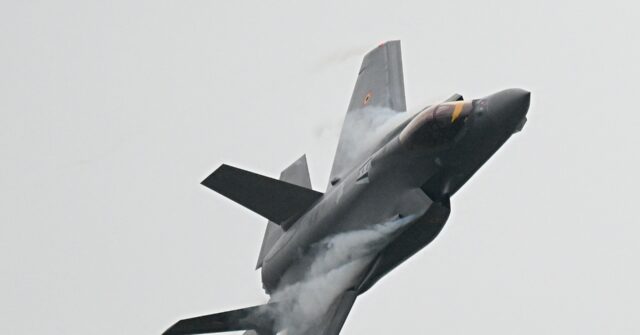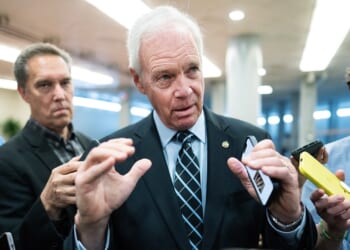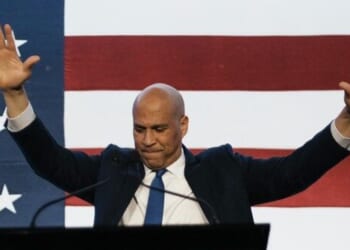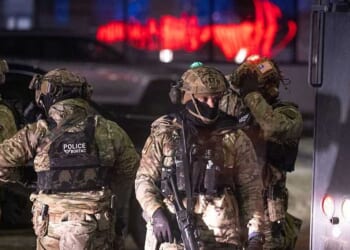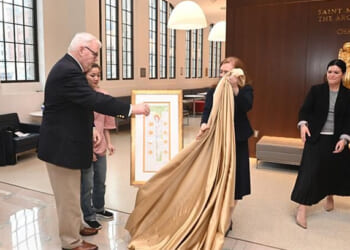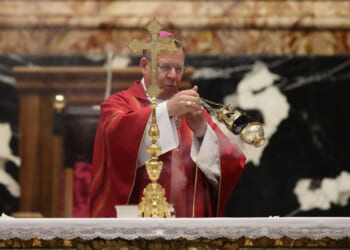Israel is pressing the Trump administration to condition any sale of advanced F-35 stealth fighter jets to Saudi Arabia on Riyadh agreeing to normalize relations with Jerusalem and join the Abraham Accords, setting up a high-stakes showdown at the White House on Tuesday as President Donald Trump hosts Crown Prince Mohammed bin Salman to discuss a massive defense deal that could include the supersonic aircraft.
Israeli officials told Axios that Jerusalem does not oppose selling the state-of-the-art jets to Saudi Arabia — unlike Turkey, which Israel strongly opposes receiving the aircraft — but stressed Washington must extract diplomatic concessions in return.
“We told the Trump administration that the supply of F-35s to Saudi Arabia needs to be subject to Saudi normalization with Israel,” one Israeli official said, warning that providing advanced weaponry without securing normalization would be “a mistake and counterproductive.”
The concern reflects Israel’s unique position as the only country in the Middle East currently operating F-35s, with 45 of the advanced fifth-generation jets in its arsenal and 30 more on order, giving Jerusalem a qualitative military edge that remains a cornerstone of U.S.–Israeli defense policy and is codified into American law.
“It takes minutes for an F-35 to fly from Saudi Arabia to Israel,” an Israeli official warned, adding that Jerusalem would likely demand Saudi jets not be stationed at air bases in the western part of the kingdom near Israeli territory.
The F-35, produced by Lockheed Martin and considered one of the world’s most advanced combat aircraft, entered operational service in the Israeli Air Force in December 2017 and belongs to the exclusive fifth-generation fighter class alongside America’s F-22 and China’s J-20.
The stealth jet can reach speeds of Mach 1.6 — roughly 1,200 miles per hour — and each aircraft costs between $80 million and $101.5 million depending on the variant, with estimates suggesting Saudi Arabia could purchase up to 48 jets in a multi-billion-dollar package.
Trump confirmed Friday aboard Air Force One that he is weighing the Saudi request, telling reporters “they wanna buy a lot of jets” as he expressed hope the kingdom would soon join the Abraham Accords.
“I hope that Saudi Arabia will be going into the Abraham Accords fairly shortly,” Trump said, adding that interest in the normalization framework has only grown since joint U.S.–Israeli strikes on Iranian nuclear facilities earlier this year.
The Abraham Accords, brokered by Trump during his first term in 2020, normalized relations between Israel and several Arab nations including the United Arab Emirates, Bahrain, Morocco, and Sudan, marking a historic shift in Middle East diplomacy.
The framework has enabled unprecedented security cooperation and economic ties between Israel and Gulf states, with the UAE already receiving U.S. approval for an F-35 purchase as part of its normalization deal — though the sale ultimately never materialized after additional conditions later stalled the process.
The crown prince’s Tuesday meeting comes as the Trump administration is pushing Riyadh to move forward on normalization following the Trump-brokered Gaza ceasefire in October.
In a phone call last month after the October 13 Sharm El-Sheikh peace conference in Egypt, Trump told bin Salman he had succeeded in ending the Gaza war and expected Saudi Arabia to move toward full diplomatic ties with Israel, according to U.S. officials cited in the report.
One senior U.S. official summed up the administration’s position bluntly. “Our message to the Saudis is: ‘We did all the things you asked for. Now, there are things President Trump wants, like normalization with Israel. So how are you guys going to move now in this direction?’” the official said.
When asked about the upcoming talks, Trump told reporters Friday it was “more than a meeting, we’re honoring” Saudi Arabia, underscoring expectations the White House visit will see the sides sign major economic and defense agreements.
However, significant obstacles remain to achieving normalization. Saudi Arabia has insisted Israel commit to “a credible, irreversible and time bound path” for Palestinian statehood — a demand Prime Minister Benjamin Netanyahu has refused and which has become even more politically divisive in Israel after Hamas’s October 7, 2023 massacre that killed 1,200 Israelis and triggered the war in Gaza.
The conflict sparked widespread anti-Israel sentiment across the Arab and Muslim world, derailing normalization talks that had appeared promising under the previous administration, when two Israeli ministers made unprecedented visits to the desert kingdom in the weeks before the October 7 attack.
Israeli officials told the report they hope Trump will press bin Salman to soften his demands and that the meeting will launch direct negotiations between the U.S., Saudi Arabia, and Israel on a potential peace deal that could materialize in the coming months. One official was blunt: “The Saudis need to change their attitude during this visit. It is important that the Trump–MBS meeting will lead to a clear road map towards normalization.”
Israeli Culture and Sports Minister Miki Zohar emphasized the stakes, writing on X that normalization with Saudi Arabia is “Israel’s top national interest and will change the future of the Middle East for generations to come,” while insisting any deal must uphold “the principles vital to Israel without recognizing a Palestinian state that would endanger our security.”
“Israel as a security superpower operating together with the Gulf powers — that is the great nightmare of Israel’s enemies,” Zohar added.
Beyond the diplomatic hurdles, a Pentagon intelligence report has raised security concerns about the potential F-35 deal, warning that China could acquire the aircraft’s sensitive technology through Saudi Arabia’s close ties with Beijing, the New York Times reported.
At the same time, Turkey is pressing to return to the F-35 program after being removed in 2019 for purchasing Russia’s S-400 air defense system, creating another complication that concerns Israel given Turkish President Recep Tayyip Erdogan’s increasingly hostile rhetoric toward the Jewish state.
Israeli officials stressed that, unlike their strong opposition to Turkey receiving F-35s, they are “less concerned about such a weapons system in Saudi Arabia if it is part of regional security cooperation as part of the Abraham Accords, like we have with the United Arab Emirates,” viewing the potential sale as part of a broader strategic realignment in the Middle East.
Trump signed the largest defense sales agreement in history with Saudi Arabia in May, worth $142 billion, calling for the U.S. to provide the kingdom with state-of-the-art warfighting equipment. At the time, Trump said it was his “fervent hope, wish, and even my dream” that Saudi Arabia would ultimately join the Abraham Accords — a decision that now appears increasingly tied to whether Riyadh is willing to pay for F-35s with normalization.
Joshua Klein is a reporter for Breitbart News. Email him at jklein@breitbart.com. Follow him on Twitter @JoshuaKlein.

